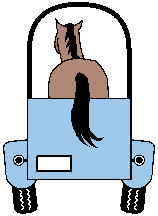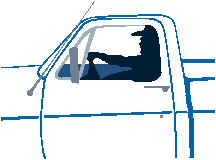|
TRAILERING

When trailering your mules, it is a good idea
to be aware of rules and regulations regarding the transportation of
animals and the regulations of the trucking industry that may apply
to you. Each state sets its own regulations and it’s up to you to
make yourself aware of these laws. Check with each state you will be
traveling through in regard to the some of the following concerns.
Weigh Stations
Sometimes we think the weigh stations are only the concern of the
eighteen wheeler that just passed while pushing you onto the
shoulder. Think again and don’t ignore them. Weigh stations are used
to regulate the commercial truck industry, but can also be used for
non-commercial vehicles as well.
State agricultural departments can use these
stations to check health papers and brands and require you to pull
in for your certification to be examined. And states can also use
these stops to check for safety requirements, registration and
driver’s licenses for non commercial vehicles.
The term “trucks” may include your pickup and
your hauling rig’s total weight may require that you be treated as
commercial. If you exceed 10,000 pounds in the combined weight of
towing vehicle and trailer, you need to check laws to see if you are
considered commercial. Check the Federal Motor Carrier Safety
Regulations which do apply to drivers of horse trailers with a few
exceptions. Check each state’s requirements in regard to your
situation. Most of the time you will be waved through station, but
failure to obey the signs to stop may carry fines and points against
your license.
Size Restrictions
There is height, width and length restrictions in each states. This
can affect the speed limit at which you are allowed to travel as
well the availability of access to some roads in a state.
Equine Health Requirements
Each state has its own requirements when it comes to Coggins and
health certificates. If you are traveling through a state, you must
meet their regulations and some health restrictions change often. If
you have questions, as your veterinarian to contact the states you
are traveling through or check them out on the Internet. Always call
ahead, not only to make sure you have the correct documentation, but
also to find out if there has been an outbreak of disease or a
quarantine in effect for a state.
Failure to have the needed health paperwork can
result in the quarantine of your animal in the state you were
passing through, impounding your rig and perhaps fines. This is all
costly in money and time. A good rule of thumb is to meet the
requirements of the strictest state you are passing through.
Safety Equipment for Horse Trailers
The Federal Motor Carrier Safety Regulations prescribe the U.S.
Department of Transportation Federal Highway Administration’s
requirements.
Different regulations apply to
trailers over 80" in overall width and trailers under 80" in overall
width and includes light, reflectors, turn signals, hazard warning
lights and safety chains, just to mention a few.
Most states require trailer brakes on trailers with ate least two
wheels with one axle with a gross vehicle weight under 3,000 pounds
and breaks on all wheels with two axles over 3.000 pounds GVW.
Trailer and Truck Maintenance
If the tires show wear, get new ones. Get new ones if they are seven
years old or older. Have wheel bearings packed with grease. Examine
hitch and electrical hookups. Check wood floors in trailers and
replace torn or worn mats. Have a tune up done on the truck.
Plan an Itinerary
Decide how far you are going to haul each day and where you will
stay the night if your trip covers a number of days. Overnighting
can be arranged at fairgrounds, racetracks, rodeo grounds, road side
rest areas, and stockyards. There are also Bed and Breakfasts and
private barns that also provide this service. Usually, the chamber
of commerce of a city can tell you if this services are available in
their area.
Once you make plans, stick to them unless
there is an emergency. Everyone’s trip, including the mules’, will
be more enjoyable if rest stops and overnight stops are planned. You
want everyone fresh and in good spirits when you arrive at your
final destination.
Time in the Trailer
Studies have shown that chances for respiratory infections for
equine skyrocket during transportation. Even in well ventilated
trailers. Bacteria grow rapidly in trailers that are
standing still while their growth is curtailed during traveling.
Limit stops to short ones which allow the mules to lower their
heads, get their legs back and urinate if they are the kind that do
not like to relieve themselves while the trailer is moving.

Offer mules water two or three times a day while
transporting. Some mules may not drink while on the road so it might
be a good idea to flavor the water two or three days before leaving
home. Than mix that flavoring agent in the water on the road. Or,
bring some water from home for traveling. To prevent dehydration,
carry electrolytes with you and put in the mule’s water for the
entire trip.
How long a mule can be hauled before
unloading or stopping for the day is determined by his tolerance to
traveling. Generally, if you’re tired of traveling, your mule
probably would like a break, too. When traveling to a trail ride,
remember you want your mule rested so he won’t be too tired to enjoy
the trails with you.
|